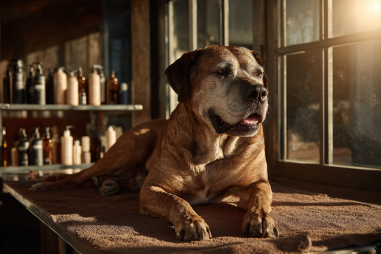Bringing a Boerboel into your home can be an exciting prospect, especially for first-time dog owners looking for a loyal and protective companion. However, understanding whether this powerful breed aligns with your experience and lifestyle is crucial before making such a commitment. Boerboels are known for their strength, intelligence, and protective instincts, but these traits come with specific needs and challenges that every potential owner should consider carefully.
Understanding Boerboel Needs and Challenges
The Boerboel, sometimes called the South African Mastiff, is a large and muscular breed originally developed for guarding homesteads and farms. Their protective nature makes them excellent family guardians but also means they require an owner capable of managing strong-willed and confident dogs. This breed isn’t typically suited to a casual or inexperienced owner because of their size, strength, and natural instincts.
One of the biggest challenges with Boerboels is their tendency to be very territorial. They need proper socialization from a young age to differentiate between genuine threats and everyday visitors or other animals. Without this, their protective nature could become excessive or problematic. Their size alone means that any behavioral issues can have serious consequences, so managing them effectively is essential.
Boerboels can also be quite independent and sometimes stubborn. They’re intelligent, but they don’t always see the point in commands unless thoroughly trained and motivated. This breed thrives in an environment where the owner is consistent, firm, and patient, yet able to provide gentle leadership rather than harsh dominance.
Essential Owner Skills and Commitments
First-time dog owners need to assess whether they have the skills, patience, and understanding to take on the responsibilities a Boerboel demands. Basic dog ownership skills like consistent training, providing mental stimulation, and maintaining a regular routine are essential. But beyond that, Boerboel owners must be confident in handling a large and potentially dominant dog.
Experience with training large breeds or working dogs would be a significant advantage. If you don’t have this experience, seeking professional guidance early on is highly recommended. Without proper training, Boerboels can quickly become unmanageable because of their strength and willpower.
Another important commitment is time. Boerboels need daily exercise, mental challenges, and social interactions to stay balanced and happy. They are not low-maintenance dogs; they thrive on active involvement from their owner. Additionally, their protective nature means they need to be taught when it’s appropriate to alert or defend and when to stand down.
Training and Socialization Demands
Training a Boerboel goes beyond teaching basic commands. This breed requires early and ongoing socialization to ensure they become well-rounded adults. Introducing them to a variety of people, animals, sounds, and environments from a puppy stage is vital to help reduce anxiety and aggressive tendencies.
Formal obedience training is strongly advised. This helps establish your role as a calm and assertive leader, a key factor in managing any dominant breed. Positive reinforcement techniques work best for Boerboels, building a strong bond based on trust rather than fear or force.
Because they are so powerful, any misbehavior can be dangerous. Thus, it’s important to address issues like jumping up, resource guarding, or excessive barking early and consistently. For first-time owners unfamiliar with advanced dog training techniques, working with a professional trainer or behaviorist can be invaluable.
Space and Exercise Needs
Boerboels are large dogs that require plenty of space to move around comfortably. Living in small apartments or houses without yards is generally not suitable for this breed. They benefit from a secure, spacious outdoor area where they can exercise and explore safely.
Exercise needs are substantial. Boerboels require daily physical activity to stay healthy and happy, such as long walks, runs, or play sessions that challenge their bodies and minds. Without sufficient exercise, they risk becoming bored and potentially destructive.
Additionally, engaging in activities like obedience training, agility, or scent work can provide excellent mental stimulation. These activities not only build your relationship but help to channel a Boerboel’s natural energies in positive ways.
Support Options for New Owners
First-time owners considering a Boerboel should actively seek support to help manage the breed’s unique demands. There are several ways to find assistance and build knowledge:
- Professional Trainers: Enlisting a trainer experienced with large guard dogs can guide you through training and socialization challenges.
- Breed Clubs and Communities: Joining Boerboel-specific groups online or locally can connect you with fellow owners who share tips and resources.
- Veterinary Care: Regular checkups and preventive care from knowledgeable veterinarians are essential to maintain your dog’s health.
- Books and Online Resources: Comprehensive guides on Boerboel care and behavior can provide valuable insight.
Having a strong support network can boost your confidence and help you address challenges before they escalate.
Making the Right Choice for Your Lifestyle
Not every first-time owner is prepared for a Boerboel, but with the right approach and commitment, it is possible to build a rewarding relationship with this majestic breed. Before getting a Boerboel, honestly evaluate your available time, living situation, prior dog experience, and willingness to invest in training and socialization.
If you are confident in your ability to lead with calm authority, provide a secure environment, and meet their physical and mental needs, a Boerboel can be a loyal and loving companion. However, if you prefer a dog with less demanding behavioral needs or smaller size, other breeds may be a better fit initially.
Ultimately, the Boerboel’s suitability for a first-time owner depends greatly on the owner’s readiness to learn and grow alongside their dog. Taking the time to prepare and seek support will set you up for success and a fulfilling ownership experience.







